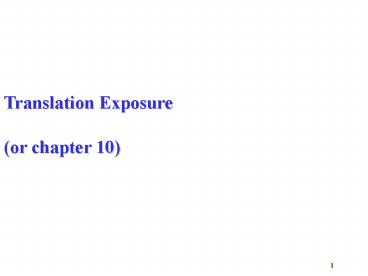Translation Exposure PowerPoint PPT Presentation
Title: Translation Exposure
1
Translation Exposure (or chapter 10)
2
Agenda
- How translation exposure arises?
- Functional currency?
- Current Rate Method vs. Temporal Method.
- Balance Sheet Hedge?
- Earnings Management.
3
Translation Exposure
- Potential for increase/ decrease in parents net
worth reported income due to forex change. - Translation method differ
- based on operation
- Integrated Foreign Entity cash flow integrated
w/ parent - Self-sustaining Foreign Entity independent of
parent - based on functional currency (currency of
economic activity) - Which currency is functional? Not a discretionary
management decision! - Cash flow
- Sales prices
- Sales market
- Expenses
- Financing
- Intercompany tranactions
4
Translation Methods
Current (Closing) Rate Method Temporal Method
Assets Liabilities translate _at_ current rate (as of balance sheet date). Assets Liabilities -Monetary translate _at_ current rates. -Non-monetary (inventory fixed assets) _at_ historical rates
Income statement Items translate _at_ actual rate when items incurred. Income Statement Items translated _at_ average rates except for depreciation cost of goods sold (_at_ historical rates)
Distributions dividends translated _at_ the rate on date of payment. Distributions dividends translated _at_ the rate on date of payment.
Equity Items Common stock Paid-in capital translated _at_ historical rates. Retained earnings /- income/loss for the year. Equity Items Common stock Paid-in capital translated _at_ historical rates. Retained earnings /- income/loss /- imbalance from translation.
Translation Adjustments not included into consolidated income but in equity reserve account. Translation Adjustments unrealized forex gains/ losses included in primary earnings.
5
US Translation Procedures
6
Hyperinflation Countries
- FAS 52 US subs in countries where cumulative
inflation 100 over 3 years use temporal method - Why? B/c if current rate method, depreciation
understated profits overstated gt book value of
PPE would disappear. - International Practices
- Integrated subsidiaries re-measure using
temporal method. - Self-sustaining subsidiaries translate by
current rate method.
7
Translation Example
- Suppose EUR depreciated 16.67 from 1.2/EUR to
1.0/EUR - Functional currency EUR, Parent US
- PPE, common stock acquired _at_ 1.276/EUR
- Inventory purchased/manufactured _at_ 1.218/EUR
- Exposed assetsasset whose value drops w/
depreciation of functional currency rises w/
appreciation of functional currency. - Net exposed assets exposed assets exposed
liability - Implications
- Appreciation -gt increase net exposed assets.
- Depreciation -gt decrease net exposed assets.
8
BALANCE SHEET TRANSLATION
9
How to manage accounting exposure?
- Balance Sheet Hedge requires equal amount of
exposed forex assets liabilities on
consolidated balance sheet - Termed monetary balance under temporal method
- Cost
- Costly if borrowing cost of parent higher.
- How to manage it if depreciation expected?
- Reduce EUR exposed assets, no change on EUR
exposed liab. - Increase EUR exposed liabilities, no change on
EUR exposed assets. - When balance sheet hedge justified?
- Subs to be liquidated
- Firm has debt covenants to maintain debt/equity
ratios - Management evaluated on basis of certain income
statement and balance sheet measures - Subs operating in hyperinflationary country
10
For example
11
Earnings Management
EARNINGS INCRASING
EARNINGS SMOOTHING
LOSS AVOIDANCE
LOSS AVOIDANCE
12
Things to remember
- How translation exposure arises?
- Functional currency?
- Current Rate Method vs. Temporal Method.
- Balance sheet hedge
- Earnings Management.

